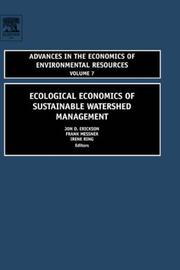| Listing 1 - 1 of 1 |
Sort by
|

ISBN: 1281049204 9786611049201 1849505071 0080488102 9781849505079 0762314486 9780080488103 9780762314485 Year: 2007 Publisher: Amsterdam Oxford Elsevier JAI
Abstract | Keywords | Export | Availability | Bookmark
 Loading...
Loading...Choose an application
- Reference Manager
- EndNote
- RefWorks (Direct export to RefWorks)
The papers in this volume illustrate the power of a scientific approach to ecological economics. Good science is a careful blend of theory and empirical testing. Theory without empirical grounding is of no practical value and random case studies without a theoretical context are not generalizable. The back and forth interplay between theory and evidence is apparent in the modeling exercises, evaluation studies, and policy design described in this book. Watershed management has been chosen as a concrete focus to illuminate the facets of sustainability. It requires both a deep understanding of the natural processes in watersheds and of the societal processes which strongly depend on the natural watershed services. Furthermore, country-specific governance structures need to be considered to fine-tune the design of sustainable watershed policies in order to approach an interaction of society and nature, which ensures a long term use of water resources without adverse effects on society and the environment. This book has accepted the challenge to tackle the complex scientific underpinning of sustainable watershed analysis and management and will reveal basic ecological economic knowledge and methodological approaches in this prominent field of research.
Watershed management --- Environmental economics --- Sustainable development --- Economics --- Environmental quality --- Watershed development --- Watersheds --- Environmental aspects --- Economic aspects --- Management --- Ecosystem management --- Business & Economics --- Management of land & natural resources. --- Environmental economics. --- Natural resources. --- General. --- Development --- Sustainable Development. --- National resources --- Natural resources --- Resources, Natural --- Resource-based communities --- Resource curse
| Listing 1 - 1 of 1 |
Sort by
|

 Search
Search Feedback
Feedback About UniCat
About UniCat  Help
Help News
News